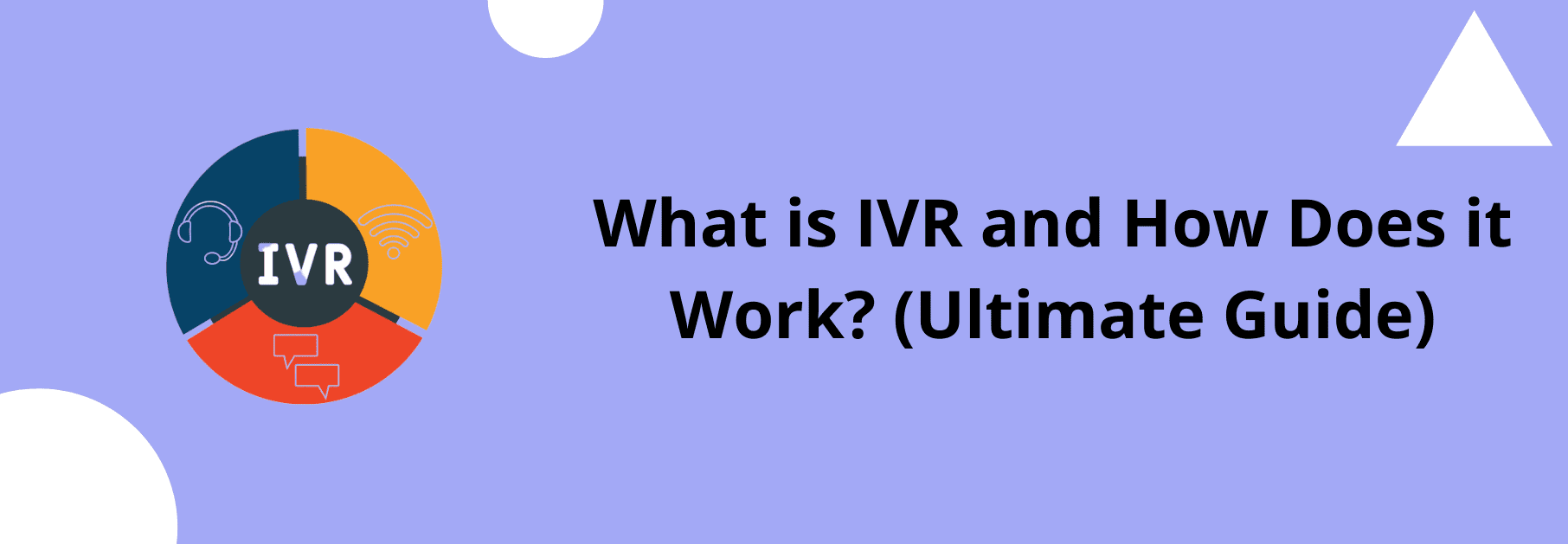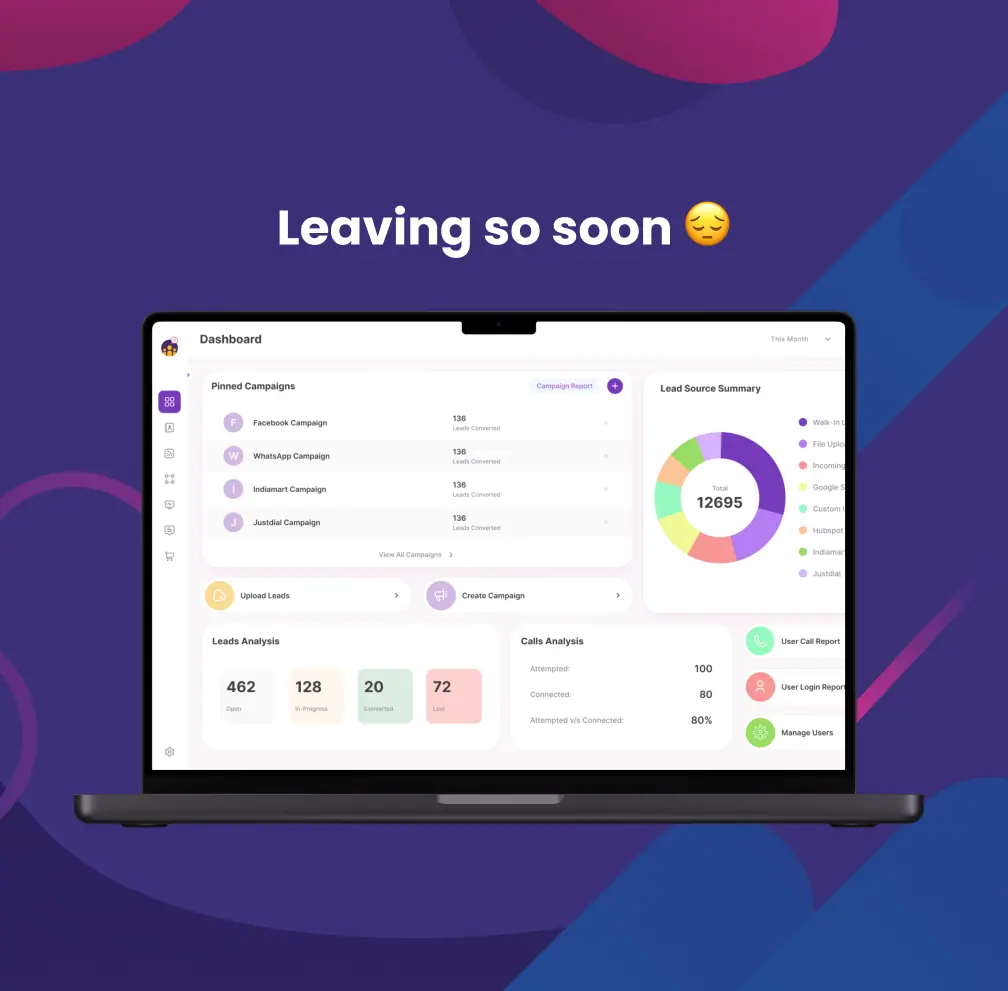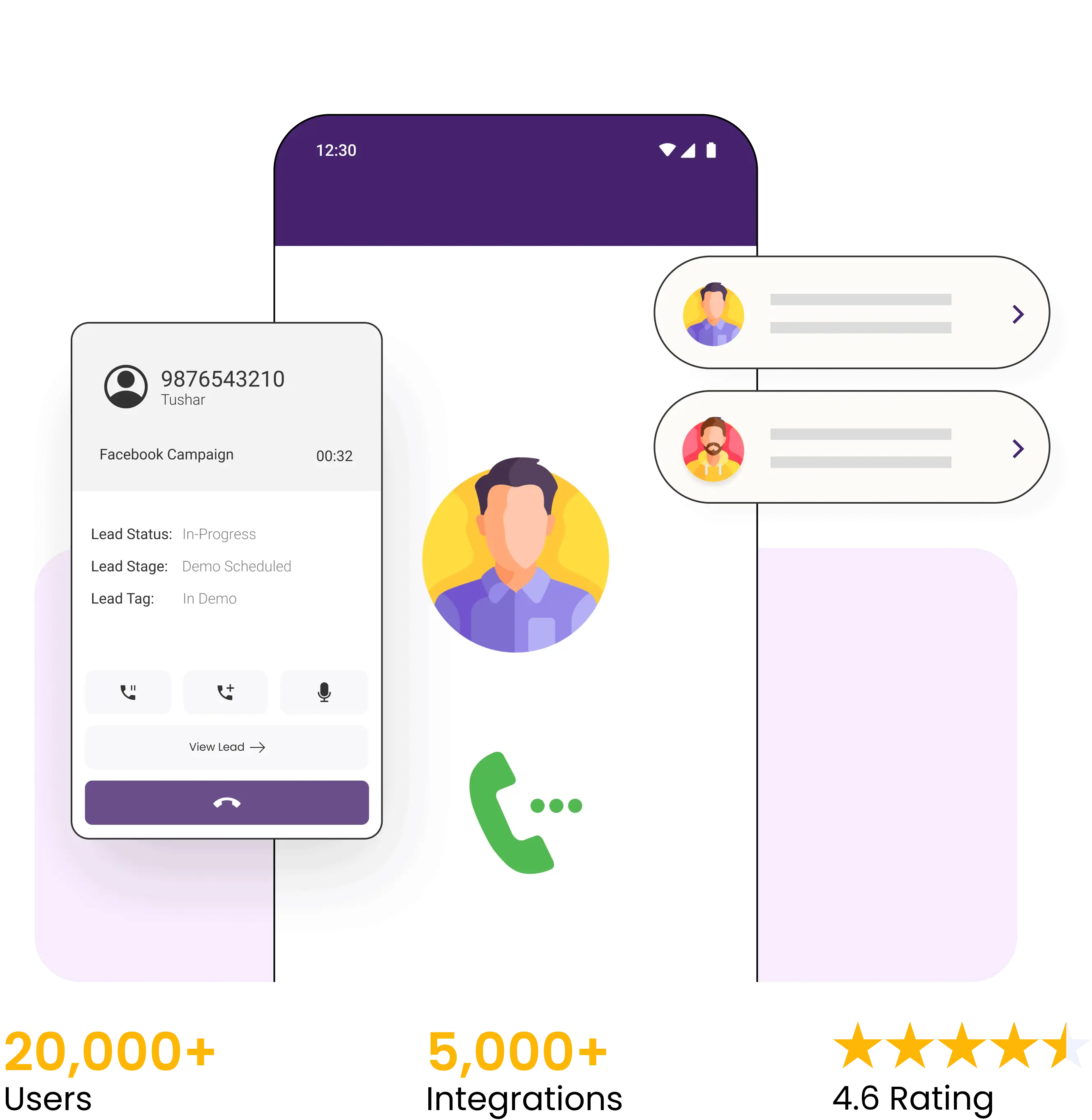FREE GUIDE
Get your copy of the ultimate guide to lead generation through telecalling (scripts included)

Have you ever hung up on or been frustrated at businesses that take too long to reply to your queries or concerns on call?
Or have you been on the other end of the line and felt that your callers are unsatisfied with the way their issues are being addressed?
Besides, who wouldn’t want to leave with a positive impression after every interaction? Surely every business wants to leave with a good impression. And, IVR may just be the solution to help accomplish that.
Now let’s take a closer look at what IVR is, what IVR calls are, how they work, IVR for call centers and all the ways they can benefit both businesses and customers.
IVR is a software system that allows you to interact with people through a recorded voice on the telephone. IVR is used in many different types of businesses from call centers to customer service personnel at companies; it’s designed for customers and potential customers who want an alternative way of reaching out with their inquiries and questions.
IVR systems are growing every day in popularity and with this, come more opportunities for call centers as well as individual businesses to increase revenue and customer retention rates.
Now, you may be wondering, what is the full form of IVR? Well, IVR stands for Integrated Voice Response.
It refers to when IVR acts as an automated phone system that combines pre-recorded messages with a dual-tone multi-frequency (DTMF) interface. This engages callers and allows them to access as well as provide information without a live agent.
Now that you understand what IVR is, let’s take a look at how it works.
If you wish to implement IVR, you’ll need a telephony board as well as specialized IVR software. And this holds true for most traditional IVR solutions.
The best thing about IVR is that it allows you to tailor recordings based on the caller’s specific requirements. For example, you will be able to access a specific service by hitting ’one’ on the keypad, and so on.
IVR allows callers to route their own calls to relevant departments. As a result, this leads to a low bounce rate as well as operating expenditure.
Below is a step-by-step breakdown of how IVR works:
In this step, the customer dials up the company contact or customer service number for a specific reason.
Here, the caller is greeted by a pre-recorded message. This message requests relevant DTMF input from the caller via their dial-pad.
After the caller provides the correct IVR input, a simple CRM data retrieval can be performed. Callers are then given the information they need and hence, their needs are met.
When the caller dials the IVR option to receive agent interaction, the caller can be routed to an appropriate agent for their issue. They then are either connected to the relevant agent/department immediately or have to wait in a queue for assistance.
In the case that a line is busy, the agent will also be able to use an auto call back in order to boost confidence. Moreover, this will also improve the caller’s experience.
IVR has three main types of systems, they are:
By utilizing an IVR system or automated voice response, businesses are able to serve large call volumes at much lesser costs.
Through IVR, businesses are able to identify, route callers, as well as resolve their concerns without transferring them to a human agent. However, if additional assistance is necessary, those calls can be transferred to human operators.
When businesses install IVR on a hosted software platform, they can easily access the IVR application through the internet.
Furthermore, companies are able to offer 24-hour customer service no matter the working hours. This enhances customer satisfaction levels, as well as conveys commitment.
With agent-assisted IVR software, you will be able to reduce the operating costs of a call center. This will all be possible while also simultaneously delivering reliable IVR customer service.
In addition to this, the agent is also capable of routing pre-recorded messages. This establishes rapport with customers, without them knowing.
If you are in the call center business or manage a telecalling team, you know it is not enough to get all your customers and contact management done on the spot.
One of the extra steps you can take to manage everything better is by availing IVR services. Without such a system in place at your call center, it’s easy for customer service representatives to get swamped during peak hours!
To put it simply, using IVR software to handle calls at a call center is an effective way to ensure that every customer receives the best service possible. The good news is that IVR service is usually inexpensive and easy to implement. It can be extremely beneficial for your customer retention rate, as well as your call center profitability.
Typically, IVRs are used by businesses or contact centers to route calls based on specific choices made by callers.
With these choices, it can determine what action needs to be taken next. This could range from callers wanting to contact a department, to the tech support team or even just wanting to talk to a human agent about their issue.
Moreover, it is also used to provide promotional information, updates or any other important instructions. For example, informing callers that their call will be recorded and if they wish to proceed further.
Originally, IVR was only used for the organization of call queues of call centers. However, IVR systems have come a long way and are now widely used for the automation of simple processes.
They are also responsible for providing self-service options to callers. This is especially useful to resolve queries and customer needs normally handled by call center agents.
IVR systems can be extremely useful for call and contact centers as well as businesses for a variety of reasons. Some of them include:
As you know, for customers, there is no greater annoyance than having to wait for hours before having your questions answered. But unfortunately, this is the reality for most customers whenever they contact a call center.
But with an IVR phone system, each stage has its own specific function.
IVR is capable of providing your callers with all the information they require. Furthermore, it even defines their needs as well as connects them to the appropriate representative in a single go.
Thus, you can eliminate the need for customers to call back and improve first contact resolution (FCR).
One of the biggest advantages of IVR is that it is not human-dependent. Once programmed, it continues to operate on its own. In contrast to humans, it is not limited by needs for rest, food or sleep.
Based on how it’s been programmed, customers can even contact companies post business hours. Here, they will normally be greeted by a pre-recorded message.
Although IVR does not entirely replace your agent’s job, it does help make it a lot easier. For example, a well-configured IVR can really take the load off of agents. It can resolve uncomplicated queries as well as significantly reduce the number of calls they have to handle.
Furthermore, it works alongside skill-based routing. This helps IVR ensure that agents only receive calls that need their attention. As a result of all of this, call center agents are much more productive.
IVRs are automated, unlike humans. This completely eliminates the chances of human error. Moreover, it also gets rid of the need for people to make judgement calls. These are what cause most call handling errors.
By automating the way your company accepts calls, you ensure that every customer will have a similar IVR experience.
Next, let’s take a look at all the amazing benefits you can get when you avail IVR services on NeoDove.
There’s more to NeoDove than its basic features. Through our Marketplace, we offer various services such as IVR, cloud telephony, bulk SMS, etc.
By opting for IVR services on NeoDove, you will be able to take advantage of both NeoDove’s key functionalities and IVR services from one place.
Moreover, all call details regarding a customer/client will be visible and easily accessible on the NeoDove platform. This provides agents with a lot more context and information and can help them better understand and respond to customer needs.
Below are the benefits of using NeoDove for IVR:
Lead collection is carried out via incoming calls. Here, leads are added automatically into the system and assigned to the agent who picks them up.
An auto-dialling feature automatically calls up new leads based on given data/input. With it, calls do not require to be made manually by agents. This increases efficiency and also reduces human error.
With the CRM integration, agents are able to more easily record call details as well as access these details from anywhere and at any time.
The ‘sticky agents’ feature ensures that the agent who initially handled a call handles all the future interactions with that specific lead. This feature is applicable for both incoming and outcoming calls.
This allows for calls to be identified and separated into two categories i.e. picked or missed. Based on its classification, you can then accordingly prioritize which calls need to be followed.
Also read: The Ultimate Buyer’s Guide on IVR: Top 5 IVR software of 2023
As you can see, no business is able to create amazing customer experiences unless it listens to its customers. But, in reality, not all clients are alike.
In these situations, Interactive Voice Response is quite useful. It implements an IVR system to allow customers to enter their concerns. Then, based on their inputs, it routes them to the most appropriate representatives.
When clients enjoy a quick and positive customer experience, all other aspects of customer engagement just fall into place. By simply investing in an effective IVR solution, you will be able to increase customer satisfaction and run your business more efficiently.
Inbound IVR refers to how the IVR system handles incoming calls.
Typically, inbound IVR applications are utilized in phone systems for businesses. For example, to provide services like music on hold, 24/7 self-service, auto attendant and automatic call routing, etc.
Whereas, outbound IVR talks about calls that are dialled out to current as well as prospective clients and customers. Applications of outbound IVR include reminder calls, notification calls and telephone surveys.
A widespread false belief is that you require a call center to use IVR. This is not always the case. In reality, companies from virtually any industry can benefit from using an Interactive Voice Response system.
Some of these cases include:
Businesses utilize IVR for 3 main purposes:
IVR enables businesses to save thousands every year in wasted talk time and provide better customer service experiences.
An IVR call flow refers to projected inputs you want callers to choose before they are connected to an agent. It operates in a similar way to a flowchart that branches out and assists callers in arriving at their destination.
In place of a live person transferring inbound calls, the IVR phone system handles it.
A flexible IVR system is capable of delivering dynamically generated content when it interacts with callers.
This specific information is conveyed to the caller through the use of a Text-to-speech (TTS) engine. This allows for text to be read aloud from specified data fields.




95% business who use NeoDove report 3x more profits!
Happy Customers
107k reviews

These outcomes and beyond can be yours.
Lead Leakage
Increase in call attempts
More Engagement



FREE GUIDE
Get your copy of the ultimate guide to lead generation through telecalling (scripts included)